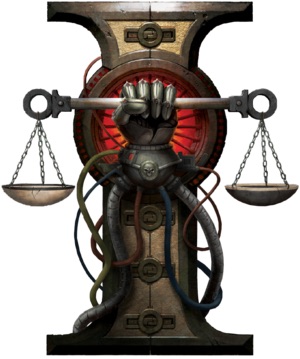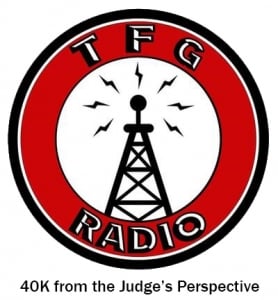Warhammer 40K: Passive vs Active Judging


Hey everyone! Adam, from TFG Radio, here to shed some light on judging in the world of competitive 40K.
 The Need for Judges
The Need for Judges
If you go to any tournament, or any event really, there is always someone that has to have a working knowledge of the rules and have the ability to make decisions if there is a dispute or some type of grey area. This doesn’t just apply to tournaments. Whether it is a narrative event, a friendly tournament, or even a casual game between friends, there is always a third party that will be needed to make a ruling. In the ancient Rogue Trader days this was the Game Master(GM) as this was in keeping with the way that Games Workshop wanted the game to be played. As Games Workshop created the new edition, they did away with the idea of a game master and went with the old “roll a die” way of resolving rules issues that we know and loathe today. As the number of attendees at grand tournaments grow, for example, the Las Vegas Open was sold out of it’s 800 tickets for the 40K Champs in 24 hours, the need for more judges for these events grows. With these judges, there are really only two ways to judge the tournament: passive judging and active judging, and they mean more or less what they say.
Passive Judging
Passive judging can probably also be called reactive judging. It’s almost like being a police officer(the cop/people ratio is a lot better though). You don’t normally go after the players but wait for something to happen or get called to a table by someone. You don’t stay at the judge’s table, or you shouldn’t, but walk the floor of the tournament area. This lets the players know you are around and, hopefully, more easily get your attention, allows the judge to get to the table with a question much more quickly, and actually give you some exercise in the process. Passive judging allows you be a judge for more players. You don’t have to be at every table but then you normally don’t have to worry about every player. You can easily hover near the tables that may need more attention without putting those players on alert that you’re watching them. If they are relaxed they are more prone to commit whatever acts they have done before or you have been warned about. Unfortunately being a passive judge also opens it up to players not calling you over to the table more often than if you’re an active judge. Since you are not actively looking at the table, combined with the “not wanting to be seen as a dick” attitude of most players, some issues may fall through the cracks. These issues are rarely brought to your attention in time, are told to you well after the game it happened or when the tournament ends, or you only find out in various Facebook groups.
Active Judging
Active judging is just what it says. You take a more proactive approach to judging the game. This means that if you are paying closer attention to the tables, whether its the bottom or top table, as you walk by and make corrections to the game, whether you were asked to or not. This is beneficial in that it shows that you are trying to keep the games clean and fair for both sides, and shows, to some, that you care about what is going on in the tournament. It does take a lot more bodies to judge events in this manner, and can often limit the size of the event due to the number of competent and knowledgeable judges you can get. One of the drawback is that you better make sure that the judge knows the relevant rules and FAQs. Because that judge will be interrupting games to make decisions, if they are wrong, it can greatly affect a game or games. You also don’t want a judge that is a bit overzealous on their active judging. We have all seen a sporting event where it was the referees that decided the game, not the players. With active judging, and even passive judging to some extent, the last thing you would want is for the finals to be decided by the decision of the judge as opposed to the actions of the players. Active judging just has a better chance of this happening.
The Perfect Balance?
From my experience, I prefer passive judging the player pool with active judging the stream tables. It is actually easier in today’s stream environment with the chat acting as active judges. They may not always be right but they will at least cause the judge at the table to double check things and even see things that the judge may have not caught when they were busy doing something else. If you are a judge, or are thinking about it, your judge style is one you should think about.
If you do judge, or play in tournaments, tell me how you would prefer the judging or of a different way to judge events, in the comments.





